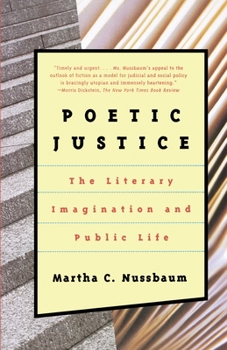Poetic Justice: The Literary Imagination and Public Life
Select Format
Select Condition 
Book Overview
In Poetic Justice, one of our most prominent philosophers explores how the literary imagination is an essential ingredient of just public discourse and a democratic society.
Format:Paperback
Language:English
ISBN:0807041092
ISBN13:9780807041093
Release Date:April 1997
Publisher:Beacon Press
Length:168 Pages
Weight:0.49 lbs.
Dimensions:0.4" x 5.5" x 8.5"
Customer Reviews
1 rating
The relevance of literature
Published by Thriftbooks.com User , 23 years ago
I read this book alongside Rorty's "Achieving Our Country." Both are concerned with similar themes; I was interested especially in how both authors addressed the relevance of literature in shaping our moral and political beliefs. But whereas Rorty's consideration of the moral value of literature is limited to a contrast with deconstructive approaches to literature, Nussbaum takes a more detailed approach. Using concrete studies of both works of fiction (Richard Wright's "Native Son" and several works by Dickens are featured prominently) and legal cases to reveal how a sense of the particular is developed and maintained through the reading of fiction, and may be applied to moral and judicial reasoning. Being attuned to particulars, she argues, allows for sympathetic identification (with characters in novels, and with defendants in trials), and thus a sense of compassion and mercy. This short, easy to read book is, I think, a good introduction to her work on both law and literature (subjects she teaches on at Chicago) -- the relation between which is developed further, in greater detail, in both "Love's Knowledge" and "Sex and Social Justice."






